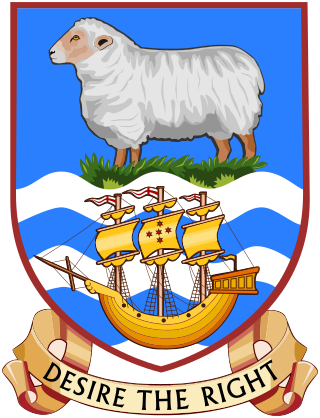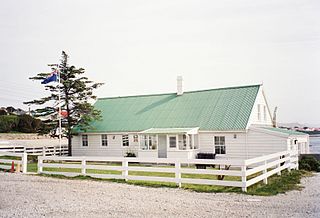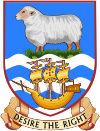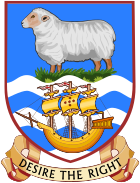
The politics of the Falkland Islands takes place in a framework of a constitutional monarchy and parliamentary representative democratic dependency as set out by the constitution, whereby the Governor exercises the duties of head of state in the absence of the monarch and the Chief Executive is the head of the Civil Service, with an elected Legislative Assembly to propose new laws, national policy, approve finance and hold the executive to account.

The governor-general of Australia is the representative of the monarch, currently King Charles III, in Australia. The governor-general is appointed by the monarch on the recommendation of the prime minister. The governor-general has formal presidency over the Federal Executive Council and is commander-in-chief of the Australian Defence Force. The functions of the governor-general include appointing ministers, judges, and ambassadors; giving royal assent to legislation passed by parliament; issuing writs for election; and bestowing Australian honours.

The governor of North Carolina is the head of government of the U.S. state of North Carolina. Seventy-five people have held the office since its inception in 1776. The governor serves a term of four years and chairs the collective body of the state's elected executive officials, the Council of State. The governor's powers and responsibilities are prescribed by the state constitution and by law. They serve as the North Carolina's chief executive and are tasked by the constitution with faithfully carrying out the laws of the state. They are ex officio commander in chief of the North Carolina National Guard and director of the state budget. The office has extensive powers of appointment of executive branch officials, some judges, and members of boards and commissions. Governors are also empowered to grant pardons and veto legislation.

The Government of New South Wales, also known as the NSW Government, is the democratic administrative authority in New South Wales, Australia, and is empowered by the state Constitution. Since Federation in 1901, New South Wales has been a state of Australia, and the federal Constitution regulates its relationship with the Commonwealth. Under the Australian Constitution, all states ceded legislative and judicial supremacy, but retained powers in all matters not in conflict with the Commonwealth.

The government of Ontario is the body responsible for the administration of the Canadian province of Ontario. A constitutional monarchy, the Crown—represented in the province by the lieutenant governor—is the corporation sole, assuming distinct roles: the executive, as the Crown-in-Council; the legislature, as the Crown-in-Parliament; and the courts, as the Crown-on-the-Bench. The functions of the government are exercised on behalf of three institutions—the Executive Council; the Provincial Parliament ; and the judiciary, respectively. Its powers and structure are partly set out in the Constitution Act, 1867.

The Legislative Assembly of the Falkland Islands is the unicameral legislature of the British Overseas Territory of the Falkland Islands. The Legislative Assembly replaced the Legislative Council when the new Constitution of the Falklands came into force in 2009 and laid out the composition, powers and procedures of the islands' legislature.

The New Zealand Constitution Act 1852 was an Act of the Parliament of the United Kingdom that granted self-government to the Colony of New Zealand. It was the second such Act, the previous 1846 Act not having been fully implemented.

The current Constitution of Malta was adopted as a legal order on 21 September 1964, and is the self-declared supreme law of the land. Therefore, any law or action in violation of the Constitution is null and void. Being a rigid constitution, it has a three-tier entrenchment basis in order for any amendments to take place.

The chief executive of the Falklands Islands is head of the public service responsible for the efficient and effective management of the Falkland Islands Government. The appointment, role and powers of the chief executive are set out in the Constitution of the Falkland Islands.
The Executive Council of New South Wales is the cabinet of that Australian state, consisting of the Ministers, presided over by the governor.

The Menteri Besar of Kedah or the First Minister of Kedah is the head of government in the Malaysian state of Kedah. According to convention, the Menteri Besar is the leader of the majority party or largest coalition party of the Kedah State Legislative Assembly.

The Legislative Council of Nova Scotia was the upper house of the legislature of the Canadian province of Nova Scotia. It existed from 1838 to May 31, 1928. From the establishment of responsible government in 1848, members were appointed by the lieutenant governor of Nova Scotia on the advice of the premier.

The speaker of the Legislative Assembly is the presiding officer of the Legislative Assembly of the Falkland Islands. The speaker also administers the oaths of office and allegiance.

The Legislative Council of the Falkland Islands was the unicameral legislature of the Falkland Islands from 13 November 1845 until 1 January 2009. The new constitution came into force in 2009 and replaced the Legislative Council with the Legislative Assembly of the Falkland Islands.

The Executive Council of the Falkland Islands is the policy making body of the Government of the Falkland Islands, exercising executive power by advising the Governor. It has an equivalent role to that of the Privy Council in the United Kingdom. The first Executive Council for the Falklands was inaugurated on 2 April 1845 by Governor Richard Moody.

The Falkland Islands Constitution is a predominantly codified constitution documented primarily within the Falkland Islands Constitution Order 2008, a statutory instrument of the United Kingdom. The constitution, in its present form, was made on 5 November 2008 by Queen Elizabeth II in a meeting of the Privy Council at Buckingham Palace. It was laid before Parliament on 12 November 2008 and came into force on 1 January 2009, replacing the 1985 constitution.
The royal prerogative is a body of customary authority, privilege, and immunity recognized in common law as belonging to the sovereign, and which have become widely vested in the government. It is the means by which some of the executive powers of government, possessed by and vested in a monarch with regard to the process of governance of the state, are carried out.
The Attorney-General of the Turks and Caicos Islands is the legal adviser to the Government and House of Assembly of the Turks and Caicos Islands. Previously administered indirectly via Bermuda, Jamaica and the Bahamas, the islands received their own governor and became a separate autonomous British Overseas Territory when Bahamas became independent in 1973.
The Cabinet of the Turks and Caicos Islands comprises the ministers who advise the governor on government affairs. It was known as the Executive Council under the 1988 Constitution, and was given its current name in the 2006 Constitution. The Cabinet was disbanded in 2009 when self-government in the Turks and Caicos Islands was suspended. It was reconstituted after the 2012 election.

The next Falkland Islands general election will elect all eight members of the Legislative Assembly through universal suffrage using block voting, with the Chief Executive of the Falkland Islands acting as returning officer. It will be the fifth election since the new Constitution came into force replacing the Legislative Council with the Legislative Assembly.














